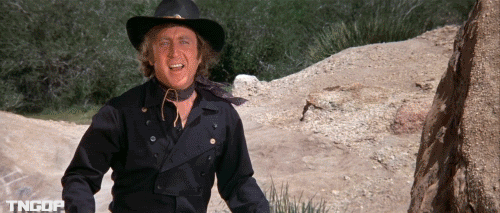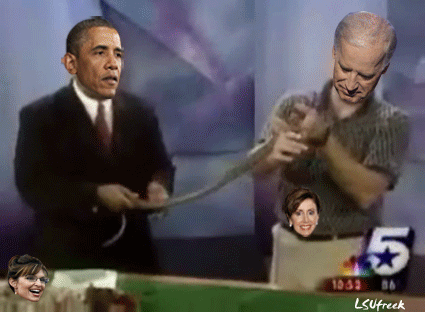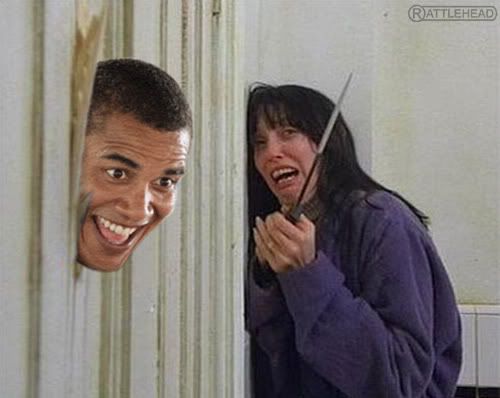This is The Plan - or a reasonable facsimile of the one - which will pass before 8/2.
Obama Renews Push for a Bipartisan Deal on Debt
By JACKIE CALMES and JENNIFER STEINHAUER
Published: July 19, 2011
WASHINGTON — President Obama on Tuesday renewed his push for an ambitious deficit-reduction deal, hailing a bipartisan package put forward hours earlier by a group of six senators as a sign of progress and summoning Congressional leaders for a new round of negotiations.
Saying time is running out to get a deal before the government hits its debt ceiling on Aug. 2, Mr. Obama said a proposal worked on for months and put on the table by the so-called Gang of Six — the group of senators who offered a plan for roughly $4 trillion in deficit reduction over the next decade — suggested there was still hope for a bipartisan deal.
The group’s plan, modeled on the recommendations last year of a fiscal commission set up by Mr. Obama, includes new revenues as well as substantial spending cuts.
The president spoke as the House prepared to vote on a Republican plan that would cut spending next year, cap it for the long term and call for a Constitutional amendment requiring a balanced budget.
Mr. Obama said the bipartisan Senate group’s proposal “is broadly consistent with the approach that I have urged.”
It is “good news,” he said, and “a very significant step.”
He urged the Congressional leadership to “start talking turkey” on Wednesday, and said “we do not have any more time to engage in symbolic gestures,” an apparent reference to the House vote.
“It will be hard, it will be tough, there still will be a lot of difficult negotiations,” he said.
As a result, he said, it was important that the negotiators also have the “fail safe” of a backup plan that would allow the debt limit to be raised in the absence of a comprehensive deal - a reference to a plan being developed by Senator Mitch McConnell, the Republican minority leader.
Mr. Obama spoke after dozens of senators from both parties turned out for a briefing on Capitol Hill by the Gang of Six, suggesting there could still be support for a broad compromise as Congress and the White House hurtle toward the debt-limit deadline.
The presentation on Tuesday marked the return to the group of Senator Tom Coburn, a conservative Republican of Oklahoma, two months after he abandoned the effort by two other Republicans and three Democrats to reach a deal, saying it would not cut spending enough. On Monday he had laid out his own $9 trillion debt-reduction plan, but acknowledged it could not be passed.
The Gang of Six presented its plan to fellow senators as the House prepared to vote on a Republican budget plan. The House bill, known as Cut, Cap and Balance, is a rejoinder of sorts to a plan hatched by the Senate Republican leader, Senator Mitch McConnell of Kentucky, that would allow Republicans to accede to an increase in the government’s debt limit without actually voting for it.
The House bill would impose strict limits on spending levels for next year, with some exceptions, and limit federal spending to just below 20 percent of the gross national product over the next decade — a deep cut relative to current spending projections. It would also permit an increase in the debt limit by $2.4 trillion only after Congress passed a Balanced Budget Amendment.
The bill, which will be debated for four hours Tuesday before an expected early evening vote, faces a veto threat from the White House and intense opposition among Democrats. It could also be opposed by some Republicans who find the cuts too deep as well as conservatives who object to any measure that would approve an increase in the debt ceiling.
If the action on the House floor showed the depth of the partisan and ideological divide over the budget, the Gang of Six presentation suggested that in the Senate at least there could still be some prospect of a compromise.
The large attendance — 47 senators, including 23 Republicans — and the positive reactions inside and outside the meeting surprised even the six senators who produced the package. It would make deep spending cuts over time in domestic and military programs, including Medicare and Medicaid, and raise new revenues from closing myriad tax breaks and loopholes, while lowering tax rates across the board – much like last year’s plan from Mr. Obama’s fiscal commission.
Senator Kay Bailey Hutchison, a Republican of Texas, said afterward that she would support the plan and believed that other lawmakers from both parties would as well. “I think that they have produced something that has mechanisms that are concrete and that’s what I think what the House is looking for and we are,” Mrs. Hutchison said.
Senator Susan Collins of Maine, also a Republican, indicated that the plan was the first serious bipartisan blueprint that she had seen.
While Mr. Obama said he did not agree with all of the senators’ plan, by his endorsement of its thrust and his remarks to reporters, he plainly sought to isolate further the House Republicans.
“We have a Democratic president and administration that is prepared to sign a tough package that includes both spending cuts and modifications to Social Security, Medicaid and Medicare that would strengthen those systems” while also providing new revenues, Mr. Obama said. And, he added, “we now have a bipartisan group of senators” and a majority of Americans who agree with such a balanced approach.
Forty-nine senators, 25 Democrats and 24 Republicans, were present for a closed-door meeting in the Capitol where those in the Gang of Six, except Mr. Coburn, outlined the debt-reduction plan that had been seven months in the works.
“It is early to say, but their timing is good,” said Senator Lamar Alexander, Republican of Tennessee. He added, “It helps that the three Republicans senators are three of the most conservative, most respected members of the Senate who are Republicans.”
Besides Mr. Coburn, those are Senators Michael D. Crapo of Idaho and Saxby Chambliss of Georgia, who formed the group with Senator Mark Warner, Democrat of Virginia. The other two Democrats are Senators Richard J. Durbin of Illinois and Kent Conrad of North Dakota, chairman of the Senate Budget Committee.
A spokesman for Speaker John A. Boehner said, “This plan shares many similarities with the framework the speaker discussed with the president, but also appears to fall short in some important areas.”
The timing displeased both Senate leaders — the majority leader, Harry Reid, Democrat of Nevada, and Mr. McConnell — who have been negotiating the fallback plan to raise the debt limit that Mr. McConnell initiated last week. At a closed-door luncheon for Democratic senators, Mr. Reid gave Mr. Warner 24 hours to develop a plan on how to move forward — a challenge the Gang of Six met later to discuss.
“I’m happy to work and use anything in the Gang of Six that we can,” Mr. Reid said. “But remember we only have 13 days — 13 days — and there’s a number of senators who have said they’ll do everything they can to stop the debt ceiling from being increased, that they would in effect allow us to default on our debt.”
After the Republican senators’ luncheon, Mr. McConnell said of the Gang of Six outline, “I haven’t had a chance to decide how I feel about it.”



















